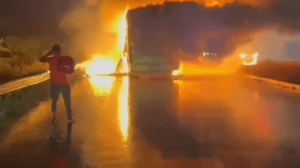Massacre in Congo despite UN presence nearby
At last the bullets had stopped, and François Kambere Siviri made a dash for the door.

At last the bullets had stopped, and François Kambere Siviri made a dash for the door. After hiding all night from firefights between rebels and a government-allied militia over this small but strategic town, he was desperate to get to the latrine a few feet away.
“Pow, pow, pow,” said his widowed mother, Ludia Kavira Nzuva, recounting how the rebels killed her 25-year-old son just outside her front door. As they abandoned his bloodied corpse, she said, one turned to her and declared, “Voilà, here is your gift.”
In little more than 24 hours, at least 150 people would be dead, most of them young men, summarily executed by the rebels last month as they tightened their grip over parts of eastern Congo, according to witnesses and human-rights investigators.
And yet, as the killings took place, a contingent of about 100 United Nations peacekeepers was less than a mile away, struggling to understand what was happening outside the gates of its base. The peacekeepers were short of equipment and men, United Nations officials said, and they were focusing on evacuating frightened aid workers and searching for a foreign journalist who had been kidnapped. Already overwhelmed, officials said, they had no intelligence capabilities or even an interpreter who could speak the necessary languages.
The peacekeepers said they had no idea that the killings were taking place until it was all over.
The executions in Kiwanja are a study in the unfettered cruelty meted out by the armed groups fighting for power and resources in eastern Congo. But the events are also a textbook example of the continuing failure of the world’s largest international peacekeeping force, which has a mandate to protect the Congolese people from brutality.
In this instance, the failure came from a mix of poor communication and staffing, inadequate equipment, intelligence breakdowns and spectacularly bad luck, said Lt Col H S Brar, the commander of the Indian peacekeepers based in Kiwanja.
But the killings and the stumbling response to the rebel advance were symptomatic of problems that have plagued the United Nations peacekeeping force in Congo for years, said Anneke Van Woudenberg, a senior researcher for Human Rights Watch, who investigated the slayings this month. The rebel onslaught was even led by a commander who is wanted on war crimes charges by the International Criminal Court.
“Kiwanja was a disaster for everyone,” Van Woudenberg said. “The people were betrayed not just by rebels who committed terrible war crimes against them but by the international community that failed to protect them.”
In the past year alone, hundreds of thousands of people have been forced to flee their homes as the rebels, led by a renegade army general, have waged a fierce insurgency against the government and its allied militias.
In an interview, the rebel general, Laurent Nkunda, denied that his troops had executed civilians here, accusing militias allied with the government of trying to make his rebel movement look bad.
“We cannot kill the population,” he said. “It is not in our behavior to kill and to rape.”
But extensive interviews with victims, aid workers and human-rights investigators showed that Nkunda’s men carried out a door-to-door military operation over two days in which young men and others were executed.



- 01
- 02
- 03
- 04
- 05




























